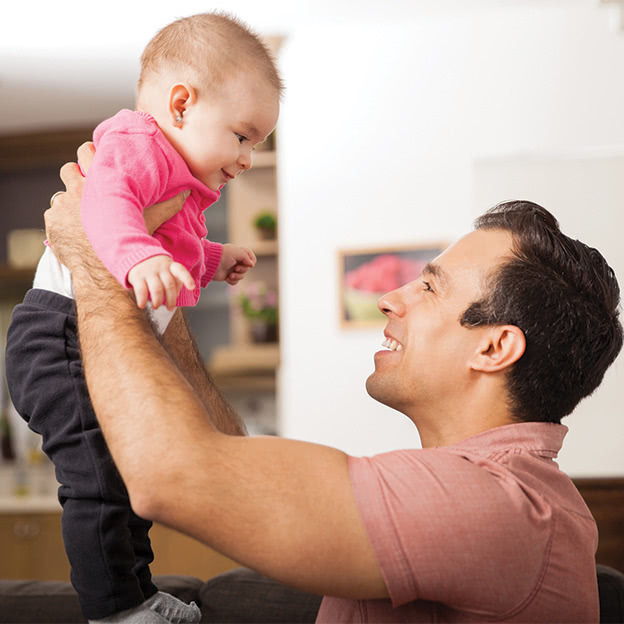
Section
Your Baby from 6 to 12 Months
How can you help your baby learn? More than anything, your consistent, loving care will help him feel secure. A secure baby is ready to learn.
Babies learn by exploring with their mouths, eyes, ears, and hands. Your baby needs things to touch, grab, push, throw, and safely put in his mouth. He needs you to play with him as much as you can. Your baby learns more from playing and being with you than from anything else.
Where to Find Help
Services for babies and toddlers at risk of disability or who have a disability.
1-800-515-2229
Information for parents on child development, vaccines, food safety, and more.
Things You Can Do
Help Your Baby Learn
Set aside time when you can sit on the floor and do what your baby wants to do.
Make a calm, safe place to play so your baby can explore freely.
Copy your baby and let him copy you.
Talk, read, sing, and play with him. Children who know a lot of words by age 3 do better in school.
Let him discover things on his own. Try not to stop him as long as he is safe.
When he does something you do not like, gently move him or remove the object from his path. This is all the discipline he needs right now.
Help Your Baby Sleep Easily
Most babies can go back to sleep by themselves by 6 months old. To help:
Make sure he eats enough during the day and before bedtime.
Put your baby to bed when he is drowsy but before he is overtired.
Have a bedtime ritual such as a bath, brushing teeth, a book, and a kiss before you turn the lights off.
If he wakes at night, check on him and help him go back to sleep by himself.
When Your Baby Gets His First Teeth
The first teeth usually start coming in around 6 months of age.
Brush your baby’s teeth twice a day with a smear of fluoride toothpaste. Take him for his first visit with a dentist by his first birthday.
Your Baby’s Personality
Find ways to support your baby’s personality. Give an active baby lots of time for play. Give a shy baby time to get used to new places and people. And give all babies lots of attention. You cannot spoil a child under 1 year of age.
Playing Is the Way to Teach
Your baby’s brain develops faster in his first year than at any other time. He learns by seeing, touching, hearing, tasting, smelling, and moving. He learns through stories, songs, rhymes, and games, like peekaboo and patty-cake. Encourage him to interact with you by answering when he babbles. When he looks away or fusses, it is time to stop playing.
Story Time
Babies love the sounds of words and the sound of your voice. They love books with simple stories and pictures of things they know. They like to wave their arms and bat the pages. As they get older, they join in and help tell the story. The Kit for New Parents includes a book for babies. To get more books for your baby, visit your local library.

Playing games with your baby is a good way to help him learn and grow.
Your Baby Learns His First Words
Between 6 and 12 months, your baby understands and says simple words.
Between 6 and 9 months, he will:
Respond to his name, and look when you call him.
Understand simple words like “no,” “bye-bye,” and “bottle.”
Babble words like “da da da” and “ma ma ma.”
Between 9 and 12 months, he will:
Repeat single words and copy animal sounds.
Point to toys or foods when asked.
Respond to both soft and loud sounds.
Get Help Early
If you have any worries about how your baby is growing, trust your feelings. Talk to your baby’s doctor as soon as you notice possible problems.
If your baby has a problem, there are programs to help. Getting help early can make a big difference in your baby’s future. Contact California Early Start.